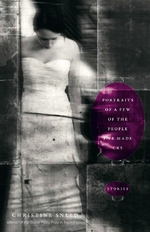American Literary Review
- An online exclusive -
Inspiration: Your Title Here
Christine Sneed
|
CHRISTINE SNEED is the author of the story collection Portraits of a Few of the People I've Made Cry, winner of the The Grace Paley Prize in Short Fiction, 2009 Association of Writers & Writing Programs (AWP) Awards Series. A graduate of the MFA creative writing program at Indiana University, Christine has published stories in Best American Short Stories, Ploughshares, Glimmer Train, Greensboro Review, and many other journals. She lives in Evanston, IL and teaches creative writing and literature courses at DePaul University in Chicago, and creative writing for the University of New Orleans' low-residency MFA program. Her personal site is www.christinesneed.com |
 |
We asked Christine, whose story "The Driver" will appear in our Fall
2011 issue, to tell us more about the ways in which she comes up with story
ideas.
THE PLACE WHERE STORIES COME FROM? I think that it must be the
same place where dreams and nightmares reside. It has no street address, no
basement or attic room. I'd say that its closest likeness is a traveling
circus, one with sideshows that scare small children, and the whole thing
sometimes leaves parents feeling like they've been conned – thirty bucks for
six rides? Whose in charge of this dump?
My stories often start with a title, one that's sometimes inspired by an
article I'm reading or by an idea that's maybe triggered by an irrational
fear. (For example, what if I were in an accident and paralyzed from the
waist down and I have a boyfriend I'm nuts about but because I'm now
paralyzed, he ends up falling in love with someone else. And guess what, his
new girlfriend and I work in the same office!) I keep a small, beat-up
notebook on my desk and another more pristine one in my nightstand. In them
I jot down ideas for titles, characters and situations that sometimes turn
into stories. Many other writers start with an image or a character who
maybe arrives with a name, maybe not. Stuart Dybek has said that he begins
his stories with a strain of music playing in his head and goes from there,
as if transcribing notes into words. Before I started writing fiction
seriously about fifteen years ago, I attended graduate school at Indiana
University as a creative writing student in poetry. I'm grateful that I did
because I think the close attention poets are taught to pay to every word
(not that fiction writers don't too, but I didn't, not at first) helped me
learn to write stories that flow outward from the few words that sit at the
top of the first page. My hope, which is sort of the inverse of Dybek's
method, is that the words will become a kind of music in the reader's head.
I want the story to carry the reader from paragraph to paragraph like the
best songs do. I don't want the reader to be glad when it's over. It'd be
nice if he or she would go back and reread it right away, as if hitting the
repeat button on the stereo.
I don't outline when I start a story and never really know what's going to
happen until I write the next sentence. This is risky, maybe, but like the
impulse that leads one line of poetry into the next, the element of surprise
is paramount for me. No surprise for the writer? Well, there probably won't
be any surprise for the reader either. I live for these surprises, the great
line that lifts your spirit and mind at the same time. One of my favorite
recent surprising lines is in Meg Wolitzer's The Wife. The line is in a
passage where the main character derides our tendency to award prizes to
each other. She wonders if other animals do similar things. "Is there an
award for Most Helpful Crow?" I laughed out loud when I read this and
wondered if Wolitzer did the same as she wrote these words. I don't know if
goods like these would be delivered if you were writing a story whose course
had already been charted in an outline.
Here is a sample of some of the titles in my notebooks, ones that haven't
yet been paired with characters, for reasons you'll probably understand:
"Paris Means Nothing"
"Please Do Not Sing While the Radio's On"
"Gwendolyn Wears Orange"
"Groucho Marx and His Glasses"
"Why Are You Hiding from Me?"
"The Poet on Poetry, Love, House Pets and Avalanches"
Some of the above were written to be used in a story that I wrote as an
academic satire about a poetry professor, one that appeared in the
New England Review in 2002. Its similarly improbable title: "This Parrot Is
Hilarious."
I have the most success when I'm having fun with my stories. Even the
serious ones sometimes make me feel like I'm getting away with mischief my
grandmother might not appreciate.
